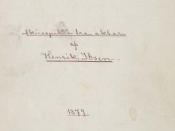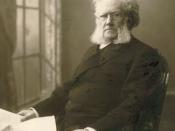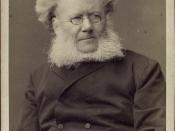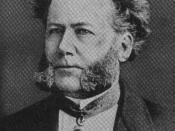The dramatis personae from drama are the subjects of plot development, and each character has his/her characteristics which show the quality of life as a human being. One essential quality of a human being is love, specially the love between husband and wife. Ideally, love creates us and our family. The concept of love, however, often relates to sensitive issues like betrayal and disappointment. The role of a wife and the ideal stereotype of a woman can be seen in examples from Henrik IbsenÃÂs ÃÂA Doll HouseÃÂ and ÃÂThe Lady from the Sea.ÃÂIn the ÃÂA Doll House,ÃÂ Nora does not realize that she is living as her husbandÃÂs doll until she becomes aware of her husbandÃÂs true personality. That reality is why she never resists or complains about her life before she perceives the fact.
Nora (going to the table, right): You know I could never think of going against you.
(1588)Nora (going toward the stove): Yes, whatever you say, Torvald. (1587)Helmer: ÃÂ ÃÂ My little songbird must never do that again. A songbird needs a clean beak to warble with. No false notes. (Putting his arm about her waist.) ThatÃÂs the way it should be, isnÃÂt it?.....
When Mr. Helmer gets to know about NoraÃÂs forgery, however, he reveals his true character. Nora concludes her life is being controlled by him as a doll, and she decides to leave home to be an independent human being.
Nora (shaking her head): you never loved me. YouÃÂve thought in fun to be in love with me, thatÃÂs allÃÂ (1629)Nora: ÃÂ You arranged everything to your own taste, and so I got the same taste as you ÃÂ or I pretended toÃÂ ÃÂ I have to try to educate myself. You canÃÂt help me with that. IÃÂve got to do it alone. And thatÃÂs why IÃÂm leaving you now. (1630)In the HelmerÃÂs time, society demanded the woman to be totally self-sacrificial. Nora and HelmerÃÂs conversation shows the atmosphere of the times.
Helmer: Before all else, youÃÂre a wife and mother.
Nora: I donÃÂt believe that anymore. I believe that, before all else, IÃÂm a human being, no less than you ÃÂ or anyway, I ought to try to become one. I know the majority thinks youÃÂre right, Torvald, and plenty of books agree with you, too. But I canÃÂt go on believing what the majority says, or whatÃÂs written in books. I have to think over these things myself and try to understand them.
Even if Nora declares her righteousness and self-reliance, she also knows that from her decision she will encounter criticism by social pressure. Nevertheless, Nora pursues equal rights for women as a self-determining individual, and that pursuit establishes her subjectivity.
In another Ibsen play, ÃÂThe Lady from the Sea,ÃÂ Ellida portrays her love for and her role as a woman. After Doctor WangelÃÂs first wife died, Ellida married him. She has two step-daughters, but there is no real affection between her and them. She was once engaged to a sailor, known as a stranger, who had then disappeared. Wangel realizes EllidaÃÂs mental instability one day, the stranger comes back to ask her to choose between him and Wangel. Wangle does not see his power in that situation, so he gives her the opportunity to choose. Left to her freedom, she decides to stay with her husband. As she is making the decision on her own, she knows that she maintains her absolute mental stability.
Wangel: What do you mean to do, then? You surely do not imagine you can take her from me by force, against her own will?The Stranger: No. What would be the good of that? If Ellida wishes to be with me she must come freely.
Ellida (starts, crying out): Freely!Wangel: And you actually believe that--Ellida (to herself): Freely! (Henrik)At first, Wangel obstinately has obstructed his wifeÃÂs initiative and has insisted on the authority of the husband. Ellida keeps asking Wangel for her free will. Wangel does not let her off at all, however, because he believes that he is the only one who can protect her. When the time comes, the stranger leaves, and Ellida declares to her husband:Ellida (with growing excitement): Wangel, let me tell you this-- tell it you so that he may hear it. You can indeed keep me here! You have the means and the power to do it. And you intend to do it. But my mind--all my thoughts, all the longings and desires of my soul--these you cannot bind! These will rush and press out into the unknown that I was created for, and that you have kept from me! (Henrik)Wangel is moved by her declaration, and he gives her the free will she so much desires because he loves her. Since then Ellida can go wherever she wants, but she also is touched deeply by his consideration and love. Ultimately, as a loving mother of 2 step-daughters, she decides not to leave with a stranger.
Throughout this play, Ellida believes that she will be able to have earnest and perfect responsibility when she can choose anything freely. She desires to go back to her husband with that kind of responsibility later.
Ellida (clasps her head with her hands, and stares at WANGEL): In freedom, and on my own responsibility! Responsibility, too? That changes everything.
[...]Wangel (looks at her for a while): Ellida, your mind is like the sea-- it has ebb and flow. Whence came the change?Ellida: Ah! DonÃÂt you understand that the change came--was bound to come when I could choose in freedom?[...]Ellida: Yes, dear, faithful Wangel--now I am coming back to you again. Now I can. For now I come to you freely, and on my own responsibility. (Henrik)Moreover, she shows stronger maternal feelings for her daughters since she gains her free will.
Ellida: And with common memories. Yours, as well as mine.
Wangel: Yes, indeed, dear.
Ellida: And for our children, Wangel?Wangel: You call them ours!Ellida: They who are not mine yet, but whom I shall win.
Wangel: Ours! (Gladly and quickly kisses her hands.) I cannot speak my thanks for those words! (Henrik)A great responsibility rests upon a woman as a wife and a mother. The responsibility, as Ellida recognizes, should be chosen by oneÃÂs intention without any enforcement and social demand. All these things blend to make the family and the community better. Throughout this play, Ellida represents a woman who gains free will power with the accompanying full responsibility.
In these two plays, Nora and Ellida have different approaches to the same problem. Nora never tries to change her situation; instead, she forces herself to be falsely satisfied with her troubled life. Finally, the end of play, she decides to leave her home, children, and her obligation. On the other hand, Ellida refuses to be satisfied with her life and pushes toward a better relationship with her husband fighting for her free will. She attempts and succeeds to preserve peace and order of family for her future. After Nora realizes how her husband has treated her, she decides to fight against her limitation. She is even not afraid of any criticism as a result of her choice. Facing a life altering choice when her ex-fiancé comes back to her, Ellida also realizes she has no free will to choose until the moment her husband relents. Because her husband eventually respects her will power, she is able to love him and her step daughters freely. Both Nora and Ellida look back upon lives, and they wake up to overcome the difficulties and errors, but in opposing ways. Yet both of them are taking the opportunity to change their life in order to become independent.
Nora and Ellida choose different ways to deal with the problems beyond love and betrayal. They made decisions that were right and unique for them. A lot of women, even in modern days, are still presented with the same kind of problems and choices. They choose to be either a mother in the home, a career woman in the workplace, or a woman of essence. Each choice can be interpreted in a different way by how people view it and what is the common value of the present. No one can judge which one is the better decision. As shown through Nora and Ellida, the right decision is the choice that proves the best for the person choosing.
Work CitedHenrik, Ibsen. The Lady From The Sea by Henrik Ibsen. Fullbooks.com. 14 Apr. 2008. .





